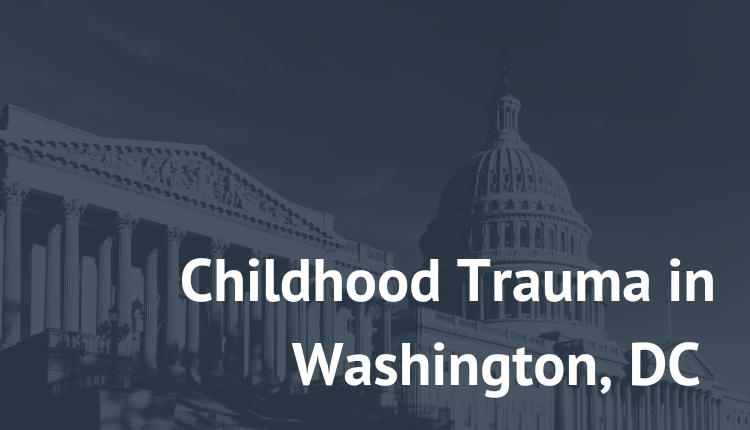Examining its Alarming Prevalence and Lasting Consequences
Washington, DC has a childhood trauma problem. As DC MAP (Mental Health Access in Pediatrics) reported in September, “nearly 23 percent of children aged 0-17 experience two or more adverse childhood experiences (ACEs) or traumas” in DC. This can impact their overall health outcomes and well-being. “ACEs can also increase the chances of a child experiencing disrupted education, legal problems and incarceration, unemployment during adulthood, serious injury, and lower life expectancy.”
DC MAP is a program funded by the DC Department of Behavioral Health. Its ACE assessment could be an underestimate. The Washington Post reported in October 2017 that 47 percent of DC children “have experienced a traumatic event, such as the death or incarceration of a parent, witnessing or being a victim of violence, or living with someone who has been suicidal or who has a drug or alcohol problem,” according to federal data. “In Maryland and in Virginia, the rate was 41 percent.”
In 1998, Vincent Felitti and his colleagues published the first study of the Adverse Childhood Experiences Questionnaire (ACE-Q). Therapists use this 10-item scale to correlate childhood maltreatment and adverse rearing contexts with adult health outcomes.
“ACE-Q research has demonstrated that exposures to adverse childhood experiences converge dose-dependently to potently increase the risk for a wide array of causally interlinked mental illnesses, addictions, and multi-organ medical diseases,” wrote Zarse, Neff, et al. in a 2018 study on two decades of research on childhood trauma. “Adverse childhood experiences and rearing may generate a public health burden that could rival or exceed all other root causes… Greater integration of mental health and addiction services for parents should be accompanied by more research into brain mechanisms impacted by different forms and interactions between adverse childhood experiences.”
Addiction and Childhood Trauma Linked
The strong correlation between addiction and trauma—especially childhood trauma—is well known. “Children need to grow up in a predictable, safe, and nurturing environment to develop a robust capacity to cope with life’s challenges and to have fulfilling relationships, careers, and life,” wrote Andrea Szasz in January in The Guardian. Szasz is the program director at South Pacific Private, an Australian treatment center for trauma, addiction, and mental health. “Our sense of self develops in the relationship with our primary caregivers, who are ideally safe, nurturing, and reliable. When this process is disrupted by trauma, loss, or any less-than-nurturing experience, it can leave us believing that we are unworthy of connection, love, and success. So often, we only realize that something has gone wrong when, as adults, we attempt to find loving, happy, and functional relationships but can’t.”
Addiction and childhood trauma in Washington, DC have statistical links as well. According to MyRecoveryDC, one in ten District of Columbia residents has an alcohol problem, nearly twice the national average. Furthermore, one in eight Washingtonians has a drug problem, another rate that’s twice the national average.
Trauma Treatment
People who believe they are unworthy of connection consequently cannot form functional relationships. They often attempt to numb the resulting emotional pain with drugs and alcohol. Untreated trauma reduces the ability of people to access their emotions. The effects of trauma make them distance themselves from family and friends, and leads to hypervigilance, anxiety, and depression. Trauma must be identified and addressed to clear the pathway for other therapies to treat addiction successfully.
Finding ways to reduce or eliminate behaviors, experiences, or other factors that retraumatize clients is part of the trauma treatment process. Oftentimes, when trauma and addiction are co-occurring, dealing with substance use problems is part of the trauma treatment process. When individuals can identify and process the sources of trauma, they can regain a healthy somatic experience of their world. They begin to feel less anxious, and experience fewer negative feelings that they attempted to suppress with substances.
New Paradigm Recovery Treats Childhood Trauma in the Washington DC area
Adverse childhood experiences and other lifetime traumas are problems regularly encountered by the clinicians at New Paradigm Recovery. Trauma is indiscriminate and affects people from every walk of life and socioeconomic background. Many New Paradigm Recovery clients are high-functioning adult professionals or younger adults with supportive families. However, ACEs and adverse life events are common underlying conditions.
New Paradigm Recovery therapists are highly trained to identify and treat trauma. Through evidence-based therapies, New Paradigm team members help clients learn to process and reframe their traumatic experiences. This process allows them to reconnect to their authentic emotions and stop experiencing the side effects of unresolved trauma.
Establishing a feeling of safety and support is key to helping clients affected by trauma. Because trauma is so prevalent, and so transforms and shapes the lives of our clients, we must establish a therapeutic rapport that helps clients feel fully supported and able to speak about deeply painful issues. Only by understanding each person fully and deeply can we develop the sense of trust that helps them believe that we can bring about meaningful change.
At New Paradigm, we use a concierge care model which allows our expert providers to spend more time with clients. Our providers schedule treatment around clients needs, access specialized resources, and address more areas of client health and well-being. Most importantly, we work diligently to support the ability to create a strong therapeutic alliance. Part of our concierge-style care includes our family therapy groups. Although childhood trauma in Washington, DC is alarmingly prevalent, family therapy can help heal those wounds. Concierge-style care also allows clinicians to spend more time working with client families. Furthermore, clinicians can collaborate with other service providers to offer a more comprehensive and effective treatment experience.

